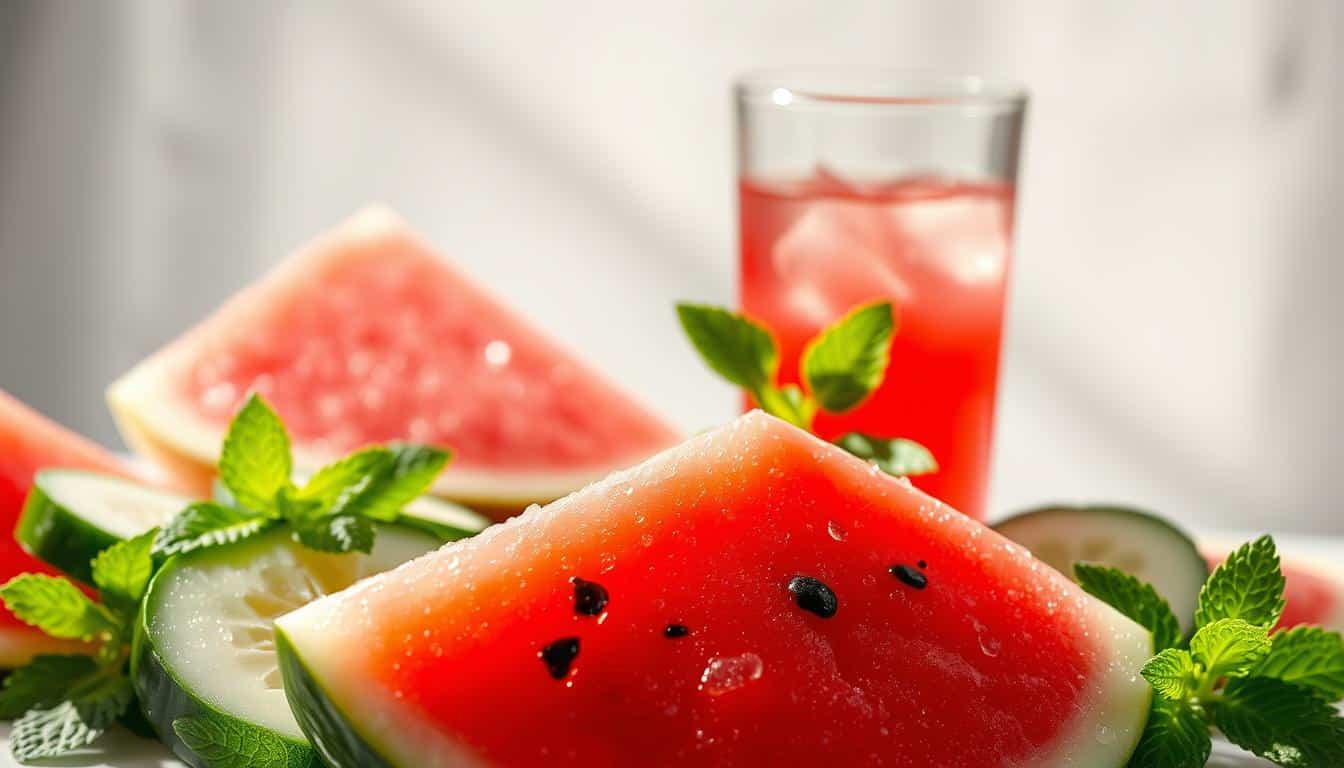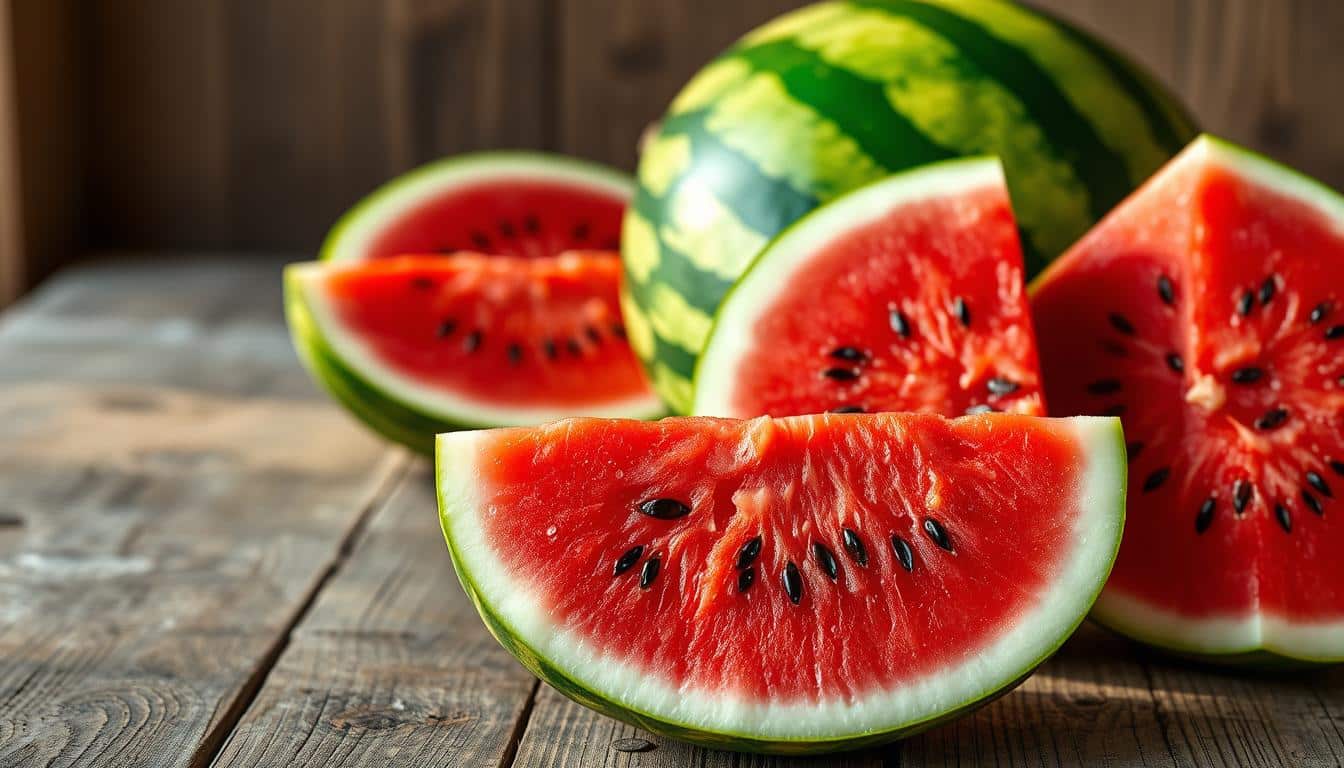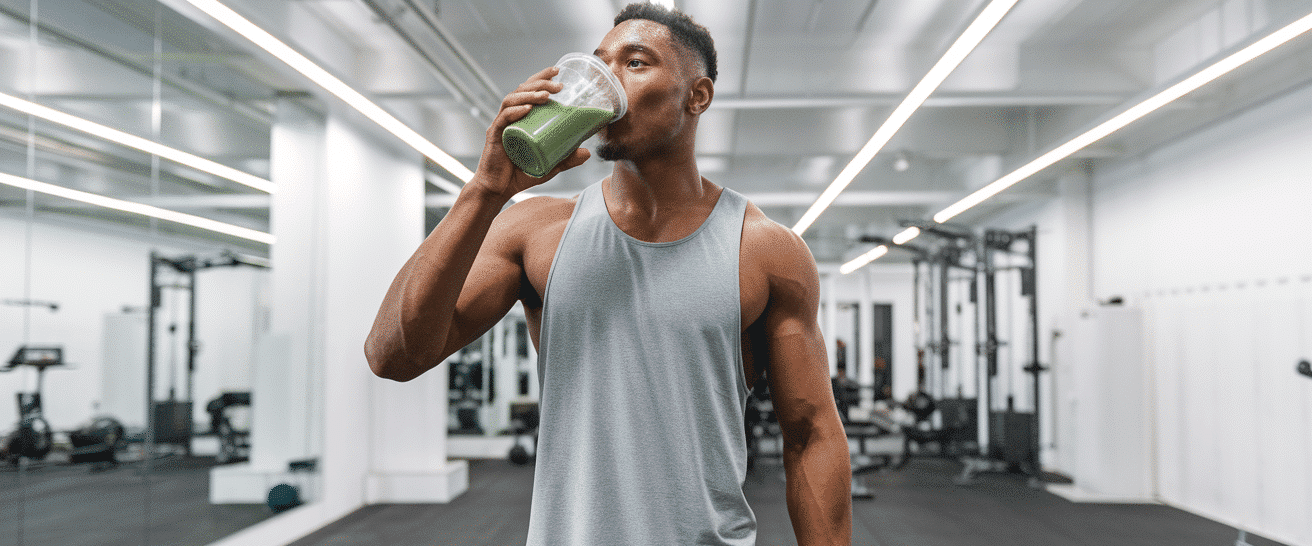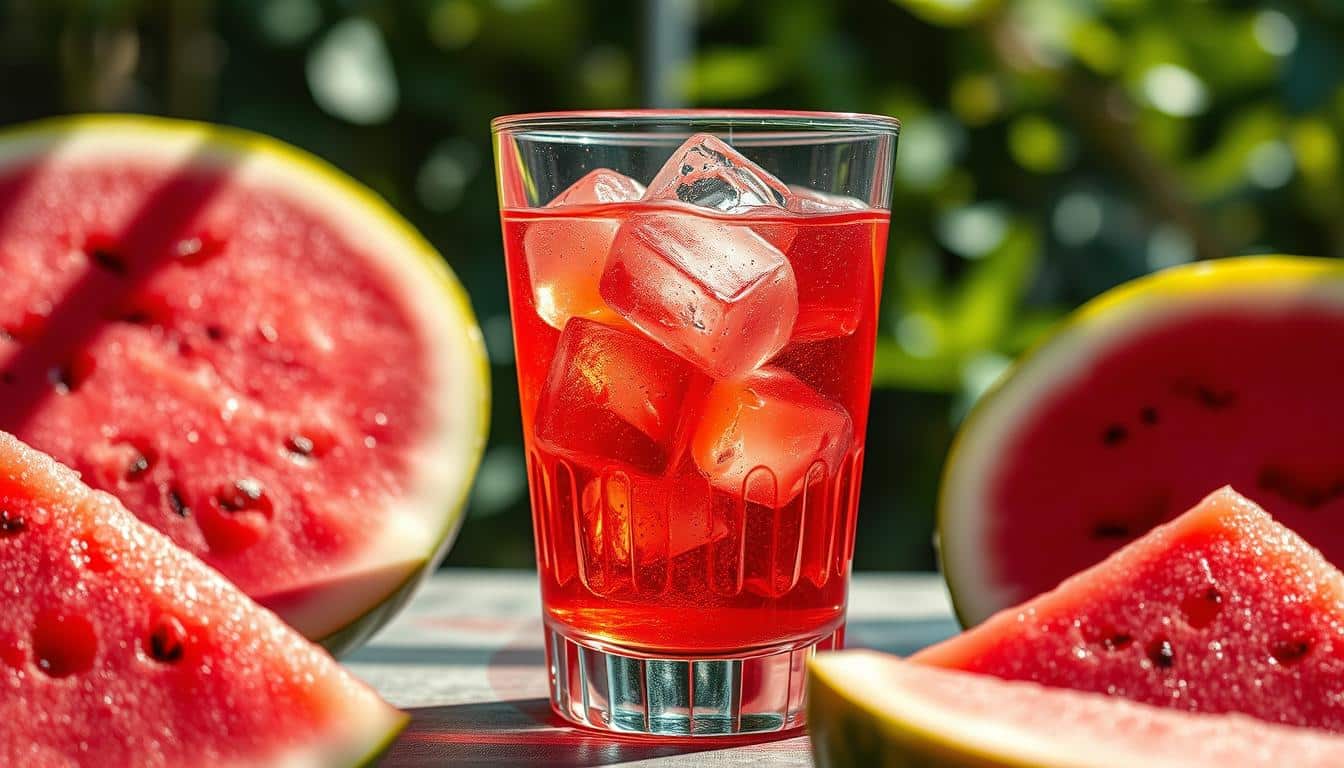Did you know your body sheds 6-12 cups of fluid daily just through basic functions? For athletes pushing their limits, that number skyrockets. What if a single fruit could help close that gap?
Nature’s juicy favorite packs a 92% water content – higher than most sports drinks. But it’s not just about quantity. This summer staple delivers natural sugars, potassium, and lycopene in every sip. Perfect for refueling without artificial additives.
Active bodies need more than H2O to recover. The magic lies in the blend of electrolytes and amino acids that help muscles bounce back faster. Studies show these nutrients improve blood flow during intense workouts.
You’ll discover how this pink powerhouse stacks up against traditional hydration methods. We’ll break down the science behind its recovery benefits and share easy ways to add it to your training routine. Ready to rethink your post-workout refreshment?
Benefits of Watermelon Juice for Hydration
Ever wonder why top trainers recommend this fruit after intense sessions? It’s not just about replacing fluids—it’s about supercharging your system with what it truly needs.

- Nutrient delivery boost: Helps shuttle oxygen to muscles and clear metabolic waste
- Heat management: Acts like internal AC during grueling workouts
- Movement support: Keeps joints gliding smoothly during lateral drills or heavy lifts
The natural sugars work double-time—providing instant fuel while helping cells absorb moisture faster than plain water. You’re not just drinking liquid; you’re giving your organs the protective cushion they need during high-stress activities.
What makes it truly special? The unique mix of plant compounds and minerals helps turn your post-workout snack into usable energy more efficiently. Your body maintains peak performance longer, whether you’re grinding through mile repeats or powerlifting sets.
Nutritional Profile of Watermelon
What’s really inside that juicy red wedge? Each serving delivers essential vitamins and minerals that keep athletes performing at their best. Let’s break down what makes this fruit a smart choice for active lifestyles.

Vitamins and Minerals
One cup packs a powerful punch. You’ll get 170mg of potassium to fight muscle cramps during sprints or climbs. The 15.2mg of magnesium keeps your energy production humming like a well-oiled machine. Need strong bones for heavy lifts? 10.5mg of calcium supports both skeletal health and muscle contractions.
Don’t overlook phosphorus—it’s your secret weapon for storing workout fuel. Add in lycopene for heart health and L-citrulline for better blood flow, and you’ve got nature’s multivitamin.
Electrolytes and Hydration Support
This isn’t just about quenching thirst. The natural electrolytes in every bite team up to balance fluids in your cells. Potassium partners with magnesium to prevent dehydration headaches mid-training. Phosphorus helps convert snacks into usable energy faster.
Compare this to sports drinks loaded with artificial additives. Here, you’re getting nutrients straight from the source—no lab-made ingredients. Your body recognizes and uses these compounds more efficiently, keeping you stronger for longer.
Water Content and Hydration
Imagine a snack that quenches your thirst while fueling your body. Foods with high water content work like nature’s hydration tablets, delivering moisture and nutrients in every bite. The secret lies in their simple yet powerful composition—mostly H2O paired with essential vitamins.
Why Moisture-Rich Foods Matter
Your body absorbs water faster from whole foods than from plain liquids. The cellular structure helps release moisture gradually, maintaining hydration longer. This steady supply keeps joints lubricated during workouts and helps regulate body temperature.
- Rapid absorption: Cellular water enters your bloodstream quicker than bottled beverages
- Calorie control: Low energy density means you can eat more without overloading
- Dual action: Fiber content slows digestion, extending hydration benefits
| Food | Water % | Calories/Cup | Key Nutrients |
|---|---|---|---|
| Cucumber | 95% | 16 | Vitamin K, Potassium |
| Strawberries | 91% | 49 | Vitamin C, Folate |
| Spinach | 93% | 7 | Iron, Magnesium |
| Red Fruit* | 92% | 46 | Lycopene, Vitamin A |
*Common summer fruit with crimson flesh
This approach to hydration supports both performance and recovery. You’ll notice better endurance during long sessions and quicker rebound times between sets. Plus, the natural sugars provide instant energy without artificial additives.
Watermelon Juice for Hydration: Athletic Recovery and Performance
Athletes seeking an edge might find their answer in a summer staple. The crimson-fleshed fruit contains citrulline, a natural compound that transforms into nitric oxide during exercise. This process widens blood vessels, delivering more oxygen to working tissues.
Here’s why this matters: studies show regular consumption for seven days improves endurance by 15%. Your system uses these nutrients to repair micro-tears faster, reducing stiffness after heavy lifts or sprints. The results? Less downtime between sessions and steadier energy output.
Key benefits include:
- Faster heart rate recovery – returns to resting levels 20% quicker post-workout
- Enhanced blood flow – nutrients reach tired muscles more efficiently
- Natural pain relief – citrulline cuts post-exercise discomfort by half
Unlike lab-made supplements, this approach works with your body’s chemistry. The water content helps cells absorb nutrients while flushing out waste. You’ll notice lighter legs during hill repeats and quicker bounce-back after HIIT circuits.
Consistency matters. Blend fresh chunks into smoothies or sip chilled juice within 30 minutes of training. Your muscles get the raw materials they need to rebuild stronger – no artificial additives required.
Role of Lycopene in Athletic Health
What gives this summer fruit its vibrant color? Meet lycopene – the powerful antioxidant that does more than paint your snack red. This natural compound acts like your body’s defense team, shielding cells from workout stress and environmental challenges.
Intense training creates free radicals that wear down muscles. Lycopene steps in to neutralize these troublemakers, helping you recover faster. Studies suggest it may also lower blood pressure by improving blood vessel flexibility – crucial for maintaining peak performance during sprints or lifts.
Here’s why athletes care:
- Double-duty protection: Fights exercise-induced cell damage while supporting heart health
- Natural insurance: Regular intake links to reduced risks for certain cancers
- Enhanced recovery: Helps muscles bounce back by reducing oxidative stress
The crimson-fleshed fruit packs more lycopene than tomatoes or grapefruit. Your body absorbs it best when paired with healthy fats – try blending it into a post-workout smoothie with almond butter. This nutrient’s cellular-level work keeps your systems running smoothly, whether you’re recovering from hill repeats or prepping for competition.
Adding lycopene-rich foods to your plate isn’t complicated. A daily serving of this juicy favorite delivers antioxidants that may also improve insulin response, according to recent research. It’s nature’s way of helping you train harder and live healthier.
Impact on Blood Pressure and Vascular Health
Your heart works smarter, not harder, when you fuel it with nature’s cardiovascular allies. The crimson-fleshed fruit delivers two powerhouse compounds that team up to protect your circulatory system.
Lycopene’s Double Action
Lycopene does more than fight free radicals. This antioxidant helps relax artery walls, letting blood flow freely during intense workouts. Studies show regular intake can lower systolic pressure by 5-10 points – that’s like cutting a daily salt habit cold turkey.
Mineral Power Team
Potassium and magnesium aren’t just for cramp prevention. These electrolytes maintain fluid balance in blood vessels, preventing dangerous pressure spikes. They work with citrulline to boost nitric oxide production – your body’s natural vasodilator.
- 20% faster nitric oxide surge post-exercise compared to water
- Blood vessel flexibility improves within 45 minutes of consumption
- Combined effect reduces cardiac strain during endurance events
Active adults using this approach report steadier energy levels during long training sessions. Your cardiovascular system gets the support it needs without synthetic supplements. It’s like giving your arteries a daily tune-up while you hydrate.
Comparing Watermelon Juice and Plain Water
What if your go-to hydration choice is missing key nutrients? Plain water keeps you alive, but athletes need more than basic H2O to thrive. Let’s explore why smart hydration involves more than just meeting your daily water intake.
Plain water flushes minerals fast during intense workouts. Ever notice needing bathroom breaks mid-training? That’s your body dumping electrolytes it can’t retain. Watermelon’s natural sodium and potassium help cells hold onto moisture longer.
| Feature | Water | Watermelon Juice |
|---|---|---|
| Electrolytes | 0mg | Potassium: 170mg Magnesium: 15mg |
| Absorption Rate | Fast | Sustained |
| Post-Workout Recovery | Basic hydration | Muscle repair + hydration |
Your cells work better with mineral support. Studies show adding electrolytes to your water intake improves fluid retention by 40% during endurance activities. The result? Less cramping and steadier energy.
Try this instead of ditching water completely: alternate between both. Meet your daily water needs with plain H2O, then add two glasses of watermelon juice around workouts. You’ll maintain mineral balance without overloading on sugars.
Remember – hydration isn’t just about quantity. It’s about what your body keeps and uses. Pair smart fluid choices with your training demands, and watch your performance climb.
Integrating Watermelon Juice into Daily Routine
Making smart hydration choices doesn’t have to be complicated. This summer favorite can become your go-to recovery partner with minimal effort. Let’s explore practical ways to make this nutrient-rich option part of your daily rhythm.
Simple Juice Recipes
Four cups of diced watermelon and a blender are all you need. The formula below balances natural sweetness with functional benefits:
| Component | Quantity | Purpose |
|---|---|---|
| Chopped fruit | 4 cups | Hydration base + quick energy |
| Lemon juice | 2 tbsp | Enhances flavor + preserves freshness |
| Sea salt | ¼ tsp | Replenishes sodium lost through sweat |
Blend for 45 seconds until smooth. Strain for clarity or keep pulp for texture. One small melon makes two servings – perfect for sharing after weekend training.
Tips for Regular Consumption
Store batches in glass jars for up to seven days. The lemon addition acts as natural preservative while boosting vitamin C intake. Pour into ice cube trays for summer smoothie boosts.
Pre-chop fruit during meal prep Sundays. Mix with mint leaves for post-yoga refreshment. This smart addition to your routine supports muscle recovery without artificial ingredients.
Watermelon Juice in Summer Nutrition
When temperatures soar, your body craves smart fuel that cools and fuels simultaneously. The crimson fruit shines here – its 92% moisture content beats most summer snacks. Active adults lose up to 3 quarts of daily fluids through sweat, demanding smarter replenishment.
Here’s why this matters:
- Natural coolant: Helps regulate core temperature during midday runs
- Quick energy: Fructose and glucose absorb faster than processed sugars
- Built-in recovery: Electrolytes replace what’s lost in perspiration
Compare summer hydration options:
| Sports Drink | Watermelon Option | |
|---|---|---|
| Electrolytes | Artificial | Natural (potassium/magnesium) |
| Sugar per cup | 14g added | 9g naturally occurring |
| Additives | 4-6 common | Zero |
You’ll stay energized without sugar crashes during long bike rides or beach volleyball sessions. The fiber content slows digestion, providing steady fuel release. It’s like having nature’s sports drink – no lab-made ingredients required.
Beat heat exhaustion by blending frozen chunks into slushies post-training. Your taste buds get a treat while your cells receive vital nutrients. Summer performance thrives when you work with nature’s design, not against it.
Addressing Common Concerns About Sugar and Calories
Does enjoying sweet treats derail fitness goals? Let’s clear the air. A cup of this summer fruit contains just 46 calories – fewer than half a banana. Its natural sugars work differently than processed sweets, providing quick energy without spiking blood sugar levels.
Compare a medium wedge to other snacks:
- 17.7g total sugars vs 23g in a mango slice
- 0.6g fiber helps slow sugar absorption
- 92% water content naturally limits portion sizes
Your body processes these nutrients smarter than lab-made sweeteners. The glycemic load stays low when consumed in typical servings – perfect for maintaining steady energy levels during workouts. Even those managing diabetes can enjoy it by pairing with protein like nuts or yogurt.
What makes it stand out? You’re getting hydration and nutrition in one package. The fiber keeps you fuller longer while supporting digestion. It’s a guilt-free way to satisfy cravings and keep your body fueled for peak performance.


